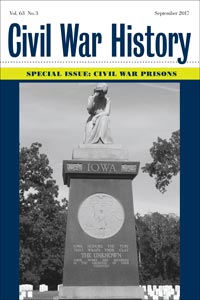September 2017, Volume 63, No. 3
Jun 21st, 2017Paternalism and Imprisonment at Castle Thunder: Reinforcing Gender Norms in the Confederate Capital
by: Angela M. Zombek
This article uses gender analysis to examine how Confederate authorities used Castle Thunder Prison in Richmond, Virginia to reinforce their notions of proper gender behavior, shifting analytic focus from intentional maltreatment and inmates’ suffering. Castle Thunder operated from April 1862 through January 1866. Throughout its history, the Confederate government – and briefly, Union victors in the post-war period – used the prison to house enemy prisoners of war, deserters from both armies, common criminals, and individuals suspected of treason. In punishing many of these offenses, both Northern and Southern officials also used the prison to correct violations of accepted gender norms, which were established during the antebellum period. Inmates likewise pledged to conform to accepted notions of male and female behavior both in hopes of securing release. This article is offered as a point of departure from which to broaden the inquiry into different aspects of imprisonment in Civil War America, and to see the story of wartime incarceration not just in terms of maltreatment, but also in terms of how prisons were used to maintain the social order amidst the chaos of war.
Captives of Memory: The Contested Legacy of Race at Andersonville National Historic Site
by: Adam H. Domby
This article examines competing memories of Andersonville Prison from 1865 to the present by tracing the role of race and racial conflict in shaping how Andersonville has been remembered. White southerners’ postwar attempts to reinterpret and erase the site’s divisive legacy met with resistance, not only from former white prisoners, but also from African Americans. The ways in which African Americans remembered the site and utilized the prison grounds in their fights for freedom and civil rights has largely been overlooked by historians. These contestations over memory helped shape the Park Service’s present interpretation of Andersonville National Historic Site. Today, Andersonville functions as a shrine to the patriotic suffering of POWs instead of as memorial to atrocity. But this celebration of sacrifice comes at the expense of some aspects of Andersonville’s unique history.
Adam H. Domby is an assistant professor of history at the College of Charleston. He is currently writing a book about the lasting legacies of wartime conflict within southern communities.
Angela Zombek earned her PhD at the University of Florida and is Assistant Professor of History at St. Petersburg College in Clearwater, Florida. Her book manuscript, Penitentiaries, Punishment, and Military Prisons: Familiar Responses to an Extraordinary Crisis during the American Civil War, is under contract with Kent State University Press.
Book Reviews
Murray, Williamson and Wayne Wei-Siang Hsieh. A Savage War: A Military History of the Civil War. Reviewed by Mark Hertling.
Army, Thomas F. Engineering Victory: How Technology Won the Civil War. Reviewed by Michael P Irvin.
Cathey, M. Todd and Gary W. Waddey. “Forward My Brave Boys!” A History of the 11th Tennessee Volunteer Infantry, CSA, 1861-1865. Reviewed by Blakeney Hill.
Gallagher, Gary W. and Caroline E. Janney. Cold Harbor to the Crater: The End of the Overland Campaign. Reviewed by Christopher S. Stowe.
Ventner, Bruce M. Kill Jeff Davis: The Union Raid on Richmond, 1864. Reviewed by Daniel Cone.
Hope, Ian C. A Scientific Way of War: Antebellum Military Science, West Point, and the Origins of American Military Thought. Reviewed by Ricardo A. Herrera.
Wongsrichanalai, Kanisorn. Northern Character: College-Educated New Englanders, Honor, Nationalism, and Leadership in the Civil War Era. Reviewed by James J. Broomall.
Hooper, Candice Shy. Lincoln’s Generals’ Wives: Four Women Who Influenced the Civil War- for Better and for Worse. Reviewed by Amy Laurel Fluker.
Seed, David, Stephen C. Kenny, and Chris Williams. Life and Limb: Perspectives on the American Civil War. Reviewed by Brian Matthew Jordan.


